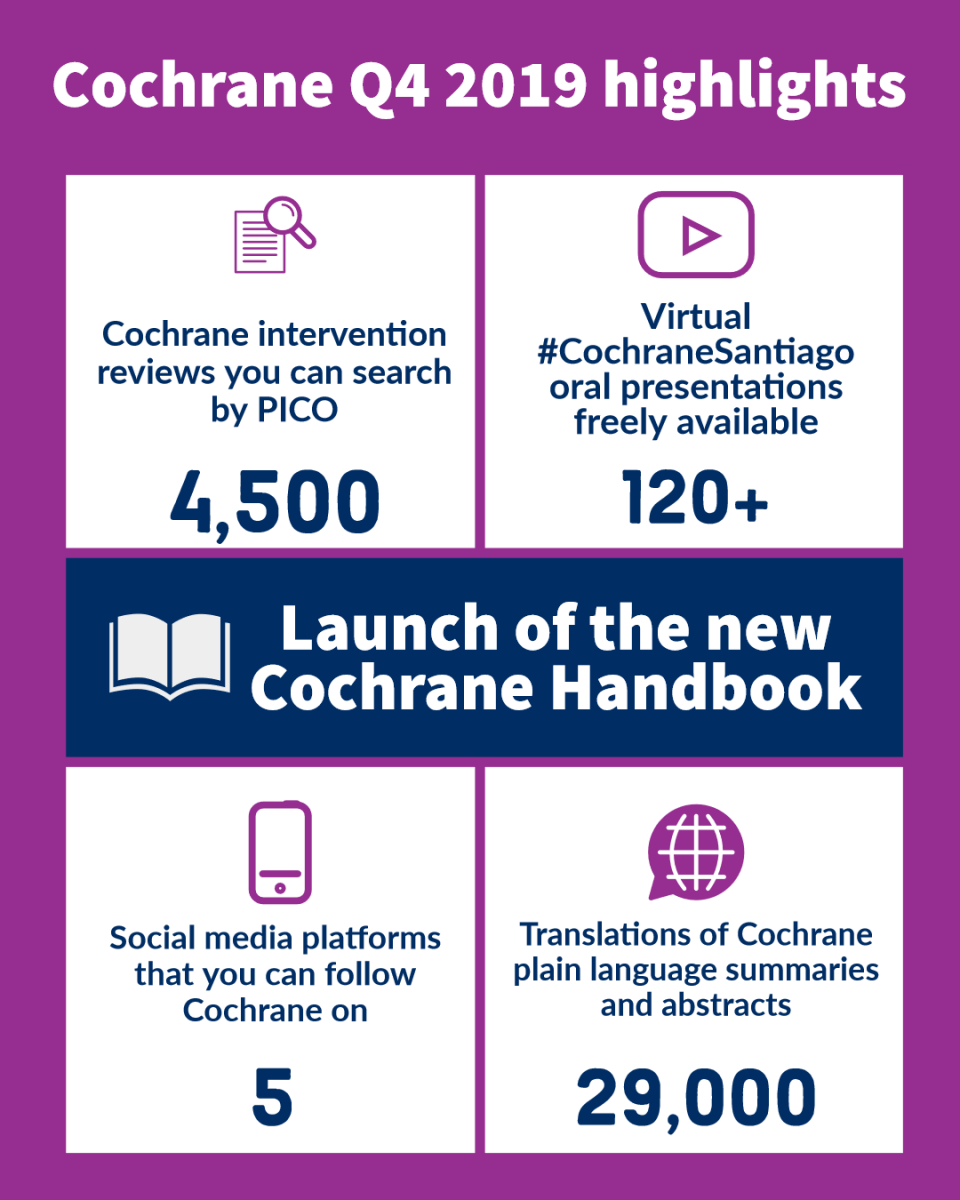
Cochrane is for anyone interested in using high-quality information to make health decisions. Whether you are a doctor or nurse, patient or carer, researcher or funder, Cochrane evidence provides a powerful tool to enhance your healthcare knowledge and decision making. Our mission is to promote evidence-informed health decision-making by producing high-quality, relevant, accessible systematic reviews and other synthesized research evidence.
October to December 2019, was a busy quarter for Cochrane! Here we provide some highlights of the last quarter of the year.


Cochrane produces high-quality, relevant, up-to-date systematic reviews, and other synthesized research evidence to inform health decision making.
In May 2019 Dr. Karla Soares-Weiser joined us as the new Editor in Chief of the Cochrane Library. She shared with us her journey through Cochrane since 1995.
Cochrane was delighted to announce the publication of the new edition of the Cochrane Handbook for Systematic Reviews of Interventions following extensive revision. The new edition includes: a new chapter addressing issues around intervention complexity; a major new chapter on network meta-analysis; substantial developments in the area of risk of bias assessment; and new chapters addressing how authors can plan the review’s questions, comparisons and outcomes.

Cochrane strives to produce evidence that is accessible and useful to everybody, everywhere in the world. We create Plain Language Summaries, provide podcasts from Cochrane Review Authors, translate our work into 15 languages, and provide Cochrane Clinical Answers. This quarter we highlighted that you can follow us on your favourite social media platforms - Twitter, Facebook, LinkedIn, YouTube, and Instagram.
The unprecedented situation of civil unrest across Santiago, Chile led to the cancellation of the physical gathering of Cochrane's annual Colloquium. Whilst it has caused huge disappointment and inconvenience for hundreds of Colloquium delegates, we were impressed by the generosity and perseverance to make the most out of this sad situation by our members and supporters. In a fitting tribute to Cochrane community‘s spirit of resilience and collaboration, we held a virtual #CochraneSantiago that was open to everyone. We shared 180 digital posters, close to 120 video oral presentations, and had many special presentations on equity in systematic reviews, how to better disseminate evidence to diverse stakeholders, and on different elements of methodological diversity. All this content is remains freely available to everyone!
We also introduced Cochrane PICO search BETA, which can help you find the most relevant Cochrane evidence to answer your research or clinical question. It allows you to search over 4,500 Cochrane intervention reviews published since 2015 by Population (or Patient or Problem), Intervention, Comparison, or Outcome.
Only around 6% of the world’s population are native English speakers, while 75% of people don’t speak English at all. This means many people do not have access to high quality health information, because it is not readily available in a language that they understand. We were delighted to officially launch of Biblioteca Cochrane - the Spanish portal of the Cochrane Library. We also highlighted Cochrane's multi-language activities in a series of short videos. We have published more than 29,000 translations of Cochrane plain language summaries and abstracts as of November 2019.

Cochrane is the ‘home of evidence' to inform health decision making. We are building greater recognition of our work and becoming the leading advocate for evidence-informed health care.
Cochrane supported an AllTrials report updating the UK House of Commons Science and Technology Select Committee on rates of clinical trial reporting among universities and NHS trusts.
Through Cochrane Crowd, our Citizen Scientist platform, we introduced many people to Randomized Controlled Trials. The community screened also screened more than 100,000 records for the #ColloquiumChallenge2019!

Cochrane strives to a be a diverse, inclusive, and transparent international organization that effectively harnesses the enthusiasm and skills of our contributors, is guided by our principles, governed accountably, managed efficiently, and makes optimal use of its resources.
Getting involved in Cochrane’s work means becoming part of a global community. We were happy to help connect our members with Cochrane Groups across the world through the launch of the Cochrane International Mobility programme! We also expanded our organization by welcoming Cochrane Dominican Republic and the Cochrane Sustainable Healthcare Field.
Karla Soares-Weiser, Cochrane Library’s Editor in Chief, outlined a new conflict of interest policy that is forthcoming in 2020 in a BMJ opinion piece. Cochrane is committed to independence, transparency, and integrity in healthcare research and minimizing the impact of conflicts of interest in the conduct of Cochrane Reviews. Although Cochrane’s current conflict of interest policy is stricter than most journals, we have revisited it recently with the aim of strengthening our approach to financial conflicts of interest and clarifying our position regarding non-financial interests.

